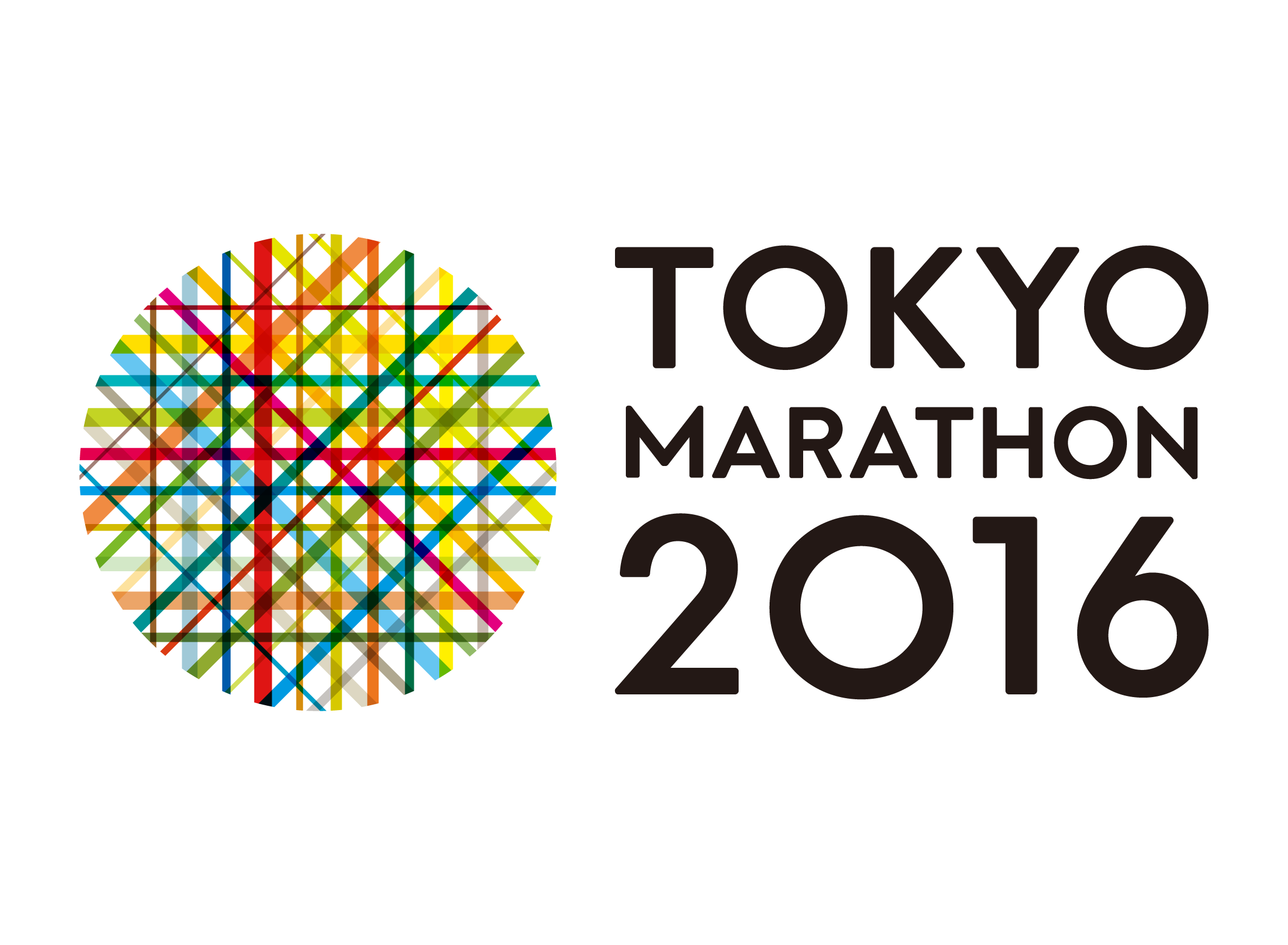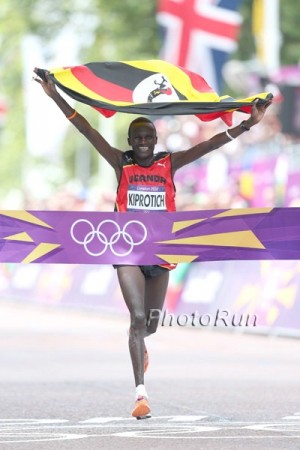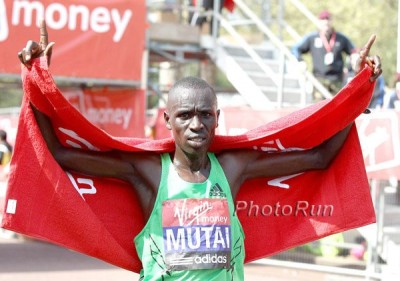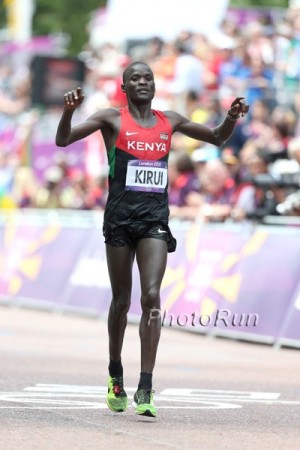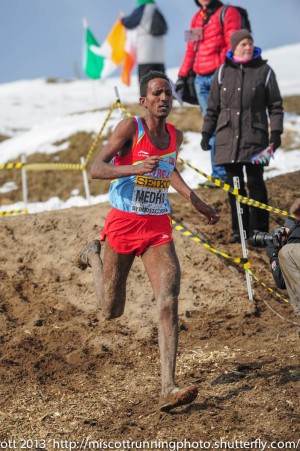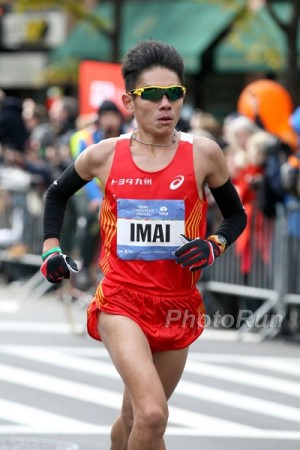2016 Tokyo Marathon Men’s Preview: Dickson Chumba Looks to Split $500,000 AWMM Title with Eliud Kipchoge; Japan’s Top Men Battle for Olympic Spots
By LetsRun.com
February 25, 2016
The 2016 Tokyo Marathon is all about beginnings and endings. Though Tokyo, which will take place on Sunday (Saturday night U.S. time) is the first Abbott World Marathon Major (AWMM) of 2016, it is the last race in Series IX of the AWMM, the first series contested under the new scoring rules that started in Tokyo last year and ends in Tokyo this year. The $500,000 Series IX prize will be awarded to one female and one male winner after Tokyo and then Series X will start in Boston this year and end in Boston next year.
For some of the elites in this year’s field, Tokyo represents their marathon debut; for others, it is their last chance to make their case for a spot at this summer’s Olympics in Rio.
Though Tokyo’s field is not as strong at the top as the April majors, Boston and London, it does contain a nice mix of runners with fast PRs and championship credentials. Emmanuel Mutai, the second-fastest marathoner in history at 2:03:13 (record-eligible courses), Chicago Marathon champion Dickson Chumba (2:04:32 pb, Tokyo course record holder) and Feyisa Lilesa (2:04:52 pb) have all run under 2:05 in the past. Tokyo also boasts two of the three 2012 Olympic medalists in Stephen Kiprotich (Olympic gold, 2013 world champ) and Abel Kirui (Olympic silver, 2009/2011 world champ). Amsterdam champ Bernard Kipyego, Berlin runner-up Eliud Kiptanui (2:05:21 pb) and Japan’s top marathoner, Masato Imai (2:07:39 pb), also feature in the elite field.
We preview the men’s elite race below. Our women’s preview is here.
What: 2016 Tokyo Marathon
When: Sunday, February 28, 9:10 a.m. Japan Standard Time (7:10 p.m. Saturday night U.S. Eastern Time)
Where: Tokyo, Japan
How to watch: NBC Sports Live Extra will stream the race live on Saturday night starting at 7:00 p.m. ET. NBC Sports Network will also air the race later that night tape-delayed from 12 a.m. to 3 a.m. ET.
All 2016 Tokyo coverage * All 2015 Tokyo coverage
Chumba Chases World Marathon Majors Title
From a global perspective, the biggest storyline is the World Marathon Majors. Series IX, which began with last year’s Tokyo Marathon, culminates with Sunday’s race, with the winner of the series receiving $500,000 in prize money. By virtue of his victories in London and Berlin last year, Eliud Kipchoge currently leads the standings with the maximum 50 points (25 points for a win; an athlete may count no more than two races toward his total. We explain the AWMM scoring system in more detail in our women’s preview). Only one man can catch him: Chicago champion Dickson Chumba, who can tie Kipchoge with a win on Sunday. Chumba is currently tied for second in the standings with 34 points (25 for winning Chicago, 9 for finishing 3rd in Tokyo last year) but if he wins his 3rd at 2015 Tokyo will be replaced by his 1st at 2016 Tokyo, giving him the max 50 points.
If Chumba and Kipchoge wind up tied, the first tiebreaker is head-to-head record during the series. Since the two did not race each other, we move on to tiebreaker #2: total victories in the series. Again, the two men would be tied with two apiece. That would mean we’d go to the third tiebreaker, which is “the athlete whom the majority of the Race Directors of the six Abbott World Marathon Majors determines to be the champion.” There is a provision in the rules which says the Race Directors may decide to award the title jointly (and presumably split the $500,000). That is probably the fairest option. Barring a massive effort by Chumba on Sunday, Kipchoge’s performances will have been more impressive, but it would be a hard pill for Chumba to swallow if he finishes with the same number of points as Kipchoge and comes away with nothing while Kipchoge receives $500,000.
Elite men’s preview
Note: You can expect a few scratches from the athletes listed below, but unfortunately we can’t tell you who those athletes are at the moment. Here’s what the marathon’s PR office sent us when we requested up-to-date fields:
“Thank you for your question. As you pointed out, some elite athletes have withdrawn. We are remaking list now. New Elite field list will be revealed at the Friday, February 26, 2016 when the Press Conference will be held. After that new list will be update. Sorry I cannot reply your request rapidly.”
| Athlete | Country | PB | Comment |
| Emmanuel Mutai | Kenya | 2:03:13 | #2 all-time (record-eligible course) in ’14 but since then only 11th London, 4th Berlin |
| Dickson Chumba | Kenya | 2:04:32 | Course record holder was 3rd in ’15; won Chicago in October |
| Feyisa Lilesa | Ethiopia | 2:04:52 | 4th Dubai, 5th Rotterdam, 3rd Berlin in ’15 |
| Abel Kirui | Kenya | 2:05:04 | 2-time world champ hasn’t broken 2:09 since 2012 |
| Eliud Kiptanui | Kenya | 2:05:21 | Coming off PR and runner-up finish in Berlin |
| Bernard Kipyego | Kenya | 2:06:19 | Amsterdam champ |
| Stephen Kiprotich | Uganda | 2:06:33 | Olympic champ PR’d here in ’15 to place 2nd; 6th at Worlds in August |
| Samuel Ndungu | Kenya | 2:07:04 | 3rd in Chicago; DNF’d Honolulu in December |
| Masato Imai | Japan | 2:07:39 | His 2:07:39 last year in Tokyo was the fastest by a Japanese man in 7+ years |
| Arata Fujiwara | Japan | 2:07:48 | 2012 runner-up was only 37th last year but ran 2:11 on December 20 |
| Kohei Matsumura | Japan | 2:08:09 | Ran PB to finish 8th in ’14 but just 25th last year |
| Hiroaki Sano | Japan | 2:09:12 | PR’d by over a minute to take 9th last year |
| Koji Gokaya | Japan | 2:09:21 | 11th last year, 9th in Berlin |
| Javier Guerra | Spain | 2:09:33 | PR’d by almost 3 mins in London in ’15; 13th at Worlds in August |
| Takehiro Deki | Japan | 2:10:02 | |
| Tsuyoshi Ugachi | Japan | 2:10:50 | |
| Hiroyuki Yamamoto | Japan | 2:11:48 | |
| Teklemariam Medhin | Eritrea | debut | |
| Kenta Murayama | Japan | debut | #4 all-time among Japanese in HM (60:50); #7 in 10k (27:39) |
The Favorite
Dickson Chumba — Kenya, 29 years old, 2:04:32 pb (2014 Chicago), 60:39 half
Last two marathons: 1st 2015 Chicago (2:09:25), 3rd 2015 Tokyo (2:06:34)
Chumba is the course record holder, he’s in his prime at 29 years old and he’s coming off his second straight strong year: after winning Tokyo and finishing third in Chicago in 2014, he flip-flopped last year, finishing third in Tokyo and winning Chicago. He’s not quite at the Kipchoge level (the two ran together for 24 miles in Chicago in 2014 before Kipchoge dropped him) but he’s on the next tier.
That position will make things challenging when it comes time to select Kenya’s Olympic marathon squad. Kipchoge has won his last four marathons and should have a spot locked up (you never know with Athletics Kenya), but the other two spots are up for grabs. If Chumba wins on Sunday, will that be enough to clinch a spot on the Kenyan team? It’s hard to say. Even with victories in Chicago and Tokyo, he could be passed over for the likes of Wilson Kipsang (former WR holder, two-time London champ, Olympic bronze medalist), Dennis Kimetto (WR holder) or Stanley Biwott (NYC champ), all of whom will race London in April.
In all likelihood, Chumba won’t just have to win on Sunday, he’ll have to run fast too — because London’s field is so much stronger than Tokyo, a 2nd in London could be worth more than a win in Tokyo. The temperature should be good for running fast (high of 58, low of 44 in Tokyo on Sunday according to Weather.com) but 13 mph winds could slow things on the course.
Threats to Win
Eliud Kiptanui — Kenya, 26 years old, 2:05:21 pb (2015 Berlin), 61:24 half
Last two marathons: 2nd 2015 Berlin (2:05:21), 7th 2015 Seoul (2:10:11)
Kiptanui is something of a Berlin specialist, as that is the only major (apart from 2011 Worlds) that he’s elected to run in his career. His results are solid — three top-five finishes since 2010, including a runner-up 2:05:21 showing last year. Kiptanui has run well at other venues (he was 5th at Worlds in ’11 and ran 2:05:39 to win Prague in ’10) but he hasn’t broken 2:10 outside of the German capital since 2012.
Obviously Kiptanui must be considered a contender in Tokyo — 2:05:21 is a time that demands attention — and at 26, he’s still got room to improve. But he needs to reaffirm that he can run fast outside of Berlin. Sunday’s race provides a perfect opportunity.
Bernard Kipyego — Kenya, 29 years old, 2:06:19 pb (2015 Amsterdam), 59:10 half
Last two marathons: 1st 2015 Amsterdam (2:06:19), 4th 2015 Boston (2:10:47)
Kipyego has been knocking on the door at the majors in recent years and 2016 could be the year he finally wins one. He’s coming off a pb (2:06:19) set in his second consecutive Amsterdam Marathon victory and has four top-four finishes in majors since the start of 2011 (including a 3rd in Tokyo in ’13 and a 4th in Boston last year). He’s also got impressive PRs at other distances (26:59/59:10, plus a silver at the World Half Champs in ’09).
The only worry is that he didn’t run particularly fast at his tuneup half marathon on January 10 (68:33) but he still managed to finish second (ahead of Abera Kuma and Emmanuel Mutai) and the winner only ran 68:08. Kipyego went on to finish 4th in Boston after taking 6th in the same race last year, so he should be okay heading into Tokyo.
Feyisa Lilesa — Ethiopia, 26 years old, 2:04:52 pb (2012 Chicago), 59:22 half
Last two marathons: 3rd 2015 Berlin (2:06:57), 5th 2015 Rotterdam (2:09:55)
Lilesa has put together four top-four finishes in majors since the start of 2010 and has run under 2:07 on four occasions, including two of his last three marathons. If he finishes the race (he’s DNF’d three times in the past three years), he’s a good bet to finish near the front. The question with Lilesa lies with his potential. After 13 career marathons, is he destined to be the perennial top-five guy who never wins a major? Or at age 26, does he have time to change the narrative? We lean toward the latter.
His tuneup race went pretty well (44:38 for 15k in Brazil on December 31; he finished seven seconds behind winner Stanley Biwott) so he should be ready to go in Tokyo.
Stephen Kiprotich — Uganda, 27 years old (on Saturday), 2:06:33 pb (2015 Tokyo), 61:15 half
Last two marathons: 6th 2015 World Championships (2:14:42), 2nd 2015 Tokyo (2:06:33)
Kiprotich is known more for his success in unrabbitted races (2012 Olympic/2013 World champ) but among the rabbitted races he’s run, Tokyo has been by far his best venue. He is the top returner based on his runner-up finish last year in a 47-second PR of 2:06:33. And his 2:07:50 here in 2012 for third (his third-fastest time ever) was the race that put him on the path to Olympic glory.
That reminds us: you can never quite predict when someone will have a big race. Past results can help, but in an event like the marathon, where it’s hard to compare performances to each other, results only go so far. Consider that four years ago, Kiprotich was making just his third marathon start in Tokyo. He had won the 2011 Enschede Marathon in his debut (2:07:20) and then took 8th at the World Championships that summer. He proceeded to take third in Tokyo in 2:07:50 yet six months later he was the Olympic champion. Likewise, Eritrea’s Ghirmay Ghebreslassie finished second in last spring’s Hamburg Marathon before becoming world champion in August.
Kiprotich’s last three marathons have all gone well (5th ’14 NYC, 2nd ’15 Tokyo, 6th ’15 Worlds) and he’s shown that he has what it takes to contend in Tokyo. Whether that is enough to hold off an in-form Chumba remains to be seen, but it should be interesting to watch the battle.
Samuel Ndungu — Kenya, 27 years old, 2:07:04 pb (2012 Otsu), 60:55 half
Last two marathons: DNF 2015 Honolulu, 3rd 2015 Chicago (2:10:06)
Ndungu used to be based in Japan, and he’s run his best races in the Land of the Rising Sun, setting his marathon best of 2:07:04 there (during his 2012 debut) and his half marathon best of 60:55 (in a win at the 2011 Marugame Half Marathon). Though he’s yet to post a truly blazing marathon (his debut remains his best time), he’s run 2:10:06 or faster in each of his six career marathons and has won exactly half of them. In October, he finished a respectable third in Chicago (41 seconds behind Chumba) but DNF’d his most recent marathon, Honolulu, in December.
Something to Prove
Emmanuel Mutai — Kenya, 31 years old, 2:03:13 pb (2014 Berlin), 59:52 half
Last two marathons: 4th 2015 Berlin (2:07:46), 11th 2015 London (2:10:54)
Mutai is known best as Mr. Runner-Up. He’s finished second in seven Abbott World Marathon Majors; heck, even running 2:03:13 wasn’t good enough to earn Mutai a win as he had to settle for second in Berlin in 2014 as countryman Dennis Kimetto broke the world record. We’re only 17 months removed from that performance, so it would not be a surprise at all to see Mutai win on Sunday.
At the same time, Mutai is in Year 10 of his marathon career and history shows that it’s hard to stay at the top for long at the 26.2-mile distance. Apart from his debut and the 2012 Olympics, Mutai’s 2:10:54 for 11th in London last year was the slowest time and lowest place of his career and though his follow-up in Berlin was better (2:07:46 for 4th), he wasn’t close to the win and finished well behind Kiptanui and Lilesa, both of whom he’ll face in Tokyo.
Abel Kirui — Kenya, 33 years old, 2:05:04 pb (2009 Rotterdam), 60:11 half
Last two marathons: 10th 2015 Amsterdam (2:10:55), DNF 2015 Boston
Kirui has more work to do than Mutai to resurrect his career. A two-time world champ and the reigning Olympic silver medalist, there’s no doubting Kirui’s credentials in championship races, but he hasn’t excelled in paced marathons and hasn’t broken 2:09 since 2012 — a time he’ll certainly need to better to be in contention on Sunday.
Kirui’s career has taken a sharp downward turn after his Olympic silver. He raced just once in 2013 (62:04 at the Marugame Half Marathon) and though he ran a full slate of races in 2014 and 2015, he didn’t approach his previous heights, taking 10th at ’14 Tokyo (2:09:04), 6th and 10th in Amsterdam (2:09:45 in ’14, 2:10:55 in ’15) and DNFing Boston last year.
The fact is, Kirui has gotten slower in each of the past five marathons he’s finished. That was all right when he was still in the 2:07/2:08 range, but it’s more troubling when he’s running 2:09s and 2:10s — and not contending for the win.
| Date | Race | Place | Time |
| 9/4/2011 | World Champs | 1st | 2:07:38 |
| 4/22/2012 | London | 6th | 2:07:56 |
| 8/12/2012 | Olympics | 2nd | 2:08:27 |
| 2/23/2014 | Tokyo | 10th | 2:09:04 |
| 10/19/2014 | Amsterdam | 6th | 2:09:45 |
| 4/20/2015 | Boston | DNF | N/A |
| 10/18/2015 | Amsterdam | 10th | 2:10:55 |
Anything short of a win will extinguish Kirui’s chances of defending his Olympic medal, and even a victory may not be enough to earn him selection to Rio.
If this is Kirui’s last time on the big stage, remember his greatness. He doesn’t get the credit he should for winning Worlds twice in a row and then getting the silver at the Olympics. Amazing.
The Debutant
Teklemariam Medhin — Eritrea, 26 years old, 61:47 half
Marathon debut
Medhin has some serious distance chops. He owns track pbs of 13:04 and 27:16 (his best finish at a global championship was 7th in the 10,000 at the 2012 Olympics) and is also a two-time medalist at the World Cross Country Championships, taking silver in 2010 and bronze in 2013. However his 2015 season did not go well. He slipped to 17th at World Cross — his lowest finish since his debut in the event in 2008 — and ran just 28:48 for 10,000 in Spain in July. Though he bettered that time at the World Champs in August, he finished just 19th out of 23 finishers in the 10,000 meters.
Still, that doesn’t necessarily portend disaster for Medhin. The man who finished right behind him in Beijing, Stephen Mokoka of South Africa, ran 2:07:40 for second in Shanghai in November, and the guy two spots in front of him, Arne Gabius of Germany, ran 2:08:33 for fourth in Frankfurt in October. So Medhin probably won’t challenge for the win in his debut, but a time in the 2:07-2:08 range is possible if he’s fit (he hasn’t raced since Beijing) and everything goes to plan.
One thing we know about Medhin: he won’t be fazed if he encounters travel issues. This is the same guy who overcame malaria symptoms and sleeping two nights in an airport to take bronze at World XC in 2013.
LRC: Meet Eritrea’s Teklemariam Medhin – LetsRun.com’s Athlete Of The Week
The Battle for the Japanese Olympic Team
Japan’s Olympic selection process is like an all-you-can-eat buffet. Instead of picking one selection criterion, the Japanese Association of Athletic Federations decided it wanted some of everything, making for a very confusing path to Rio. Japan will pick its Olympic marathon squad using the following criteria, per the Japan Times:Top eight finishers at 2015 World Champs earn auto selection (no Japanese men finished in the top 8)
- Top eight finishers at 2015 World Champs earn auto selection (no Japanese men finished in the top 8)
- Any man who breaks 2:06:30 “will preferentially be picked up for the national team.” (However, JAAF has run into problems after refusing to confirm Kayoko Fukushi‘s spot after she hit the women’s standard of 2:22:30). This standard is also ridiculous as only one man in Japanese history has ever broken 2:06:30.
- The three top Japanese finishers in three selection races (December’s Fukuoka Marathon, Tokyo and March’s Lake Biwa Mainichi Marathon) “will be included in the selection process.”
Three of the four fastest times by Japanese marathoners last year came in Tokyo, so it seems like a good bet that the top Japanese finisher (perhaps the top two) will be headed to Rio. And the race for Rio will be even more competitive than the U.S. Trials. Consider the following stats:
# of sub-2:10 guys at U.S. Trials: 2
# of sub-2:10 Japanese men at Tokyo Marathon: 5 (plus one at 2:10:02)
# of Americans sub-2:10 in 2015: 0
# of Japanese sub-2:10 in 2015: 4
# of Americans sub-2:12 in 2015: 2
# of Japanese sub-2:12 in 2015: 15
# of Americans sub-2:13 in 2015: 6
# of Americans sub-2:13 in 2015: 26
So who are the top Japanese contenders in Tokyo? Masato Imai has to be considered the front-runner. His 2:07:39 for 7th in Tokyo last year was the fifth-fastest marathon in Japanese history and the fastest since 2007. Hiroaki Sano (2:09:12 for 9th) and Koji Gokaya (2:09:21 for 11th) also ran well in Tokyo last year, finishing as the third- and fourth-fastest Japanese marathoners on the year and both should be in contention again.
34-year-old Arata Fujiwara is another man to watch. He was 11 seconds from winning this race in 2012, running his PR of 2:07:48, and though he hasn’t come close to that time since then, he did improve each time out in 2015. He began the year by running 2:19:40 for 37th in Tokyo, but ran (and won) three more Japanese marathons in 2015, most recently clocking 2:11:50 in Hofu on December 20. The relatively close proximity of that race is working against him, and there are plenty of other runners in the 2:10-2:12 range who could displace him on Sunday. But his pedigree cannot be ignored.
Finally, there is debutant Kenta Murayama. Murayama just turned 23 on Tuesday and has been making some serious waves in the Japanese distance scene. Since 2007, only one Japanese man has run faster than Murayama’s 60:50 half marathon best, and his 10,000 pb of 27:39 ranks him seventh all-time among Japanese runners (twin brother Kota owns the national record after running 27:29 in November).
- Professional
- Previews
- Road
- LRC
- Men's Running
- Distance
- Events
- Emmanuel Mutai
- Abel Kirui
- Feyisa Lilesa
- Stephen Kiprotich
- Arata Fujiwara
- Masato Imai
- Teklemariam Medhin
- Eliud Kiptanui
- Bernard Kipyego
- Tokyo Marathon
- Dickson Chumba
- Samuel Ndungu
- Kenta Murayama
- Abbott World Marathon Majors
- 2016 Tokyo Marathon
